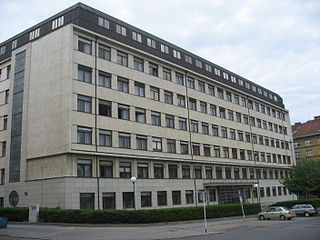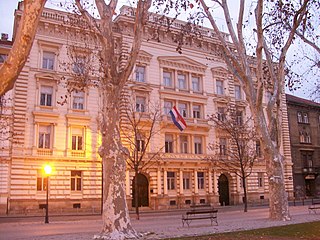The Slovak Republic has been a member of European Union since 2004. Slovakia has been an active participant in U.S.- and NATO-led military actions. There is a joint Czech-Slovak peacekeeping force in Kosovo. After the September 11, 2001 Terrorist Attack on the United States, the government opened its airspace to coalition planes. In June 2002, Slovakia announced that they would send an engineering brigade to Afghanistan.

The Judicial Yuan is the judicial branch of the government of Taiwan. It runs a Constitutional Court and oversees all systems of courts of Taiwan, including ordinary courts like the supreme court, high courts, district courts as well as special courts like administrative courts and disciplinary courts. By Taiwanese law, the Judicial Yuan holds the following powers:
The government of Czechoslovakia under Marxism–Leninism was in theory a dictatorship of the proletariat. In practice, it was a one-party dictatorship run by the Communist Party of Czechoslovakia, the KSC.

The Federal Court of Justice is the highest court of civil and criminal jurisdiction in Germany. Its primary responsibility is the final appellate review of decisions by lower courts for errors of law. While, legally, a decision by the Federal Court of Justice is only binding with respect to the individual case in which it enters, de facto the court's interpretation of the law is followed by lower courts with almost no exception. Decisions handed down by the Federal Court of Justice can only be vacated by the Federal Constitutional Court for violating a provision of the German constitution, the Basic Law.

The president of the Slovak Republic is the head of state of Slovakia and the commander-in-chief of the Armed Forces. The president is directly elected by the people for five years, and can be elected for a maximum of two consecutive terms. The presidency is largely a ceremonial office, but the president does exercise certain limited powers with absolute discretion. The president's official residence is the Grassalkovich Palace in Bratislava.

Under the Constitution of Finland, everyone is entitled to have their case heard by a court or an authority appropriately and without undue delay. This is achieved through the judicial system of Finland.

Lesbian, gay, bisexual, and transgender (LGBT) people in Slovakia face a multitude of legal and social challenges not experienced by non-LGBT residents.

In most legal jurisdictions, a supreme court, also known as a court of last resort, apex court, and highcourt of appeal, is the highest court within the hierarchy of courts. Broadly speaking, the decisions of a supreme court are binding on all other courts in a nation and are not subject to further review by any other court. Supreme courts typically function primarily as appellate courts, hearing appeals from decisions of lower trial courts, or from intermediate-level appellate courts. A Supreme Court can also, in certain circumstances, act as a court of original jurisdiction, however, this is typically limited to constitutional law.
The Constitution of Slovakia, officially the Constitution of the Slovak Republic, is the current constitution of Slovakia. It was passed by the Slovak National Council on 1 September 1992 and signed on 3 September 1992 in the Knights Hall of the Bratislava Castle. It went to effect on 1 October 1992.
The Supreme Court of Estonia is the court of last resort in Estonia. It is both a court of cassation and a constitutional court. The courthouse is in Tartu.

The Constitutional Court of Slovakia is a special court established by the Constitution of Slovakia. Its seat is in Košice in eastern Slovakia. Its head is Ivan Fiačan.
The Arizona Court of Appeals is the intermediate appellate court for the state of Arizona. It is divided into two divisions, with a total of twenty-eight judges on the court: nineteen in Division 1, based in Phoenix, and nine in Division 2, based in Tucson.

The Judiciary of the Czech Republic is set out in the Constitution, which defines courts as independent institutions within the constitutional framework of checks and balances.

The Supreme Court of the Czech Republic is the court of highest appeal for almost all legal cases heard in the Czech Republic. As set forth in the Constitution of the Czech Republic, however, cases of constitutionality, administrative law and political jurisdiction are heard by other courts.
Miss Universe Slovenskej Republiky or Miss Slovak Republic was an annual beauty pageant held in Slovak Republic to select the country's representative to the Miss Universe pageant from 1994 to 2022.
Life imprisonment in Slovakia is a sentence of indeterminate length, lasting until the convict's death. In Slovak law, since the abolishment of the death penalty in 1990, it is the most severe punishment available. After 25 years, the prisoner can apply to the prosecutor to be released on probation. At any length of time, the prisoner may apply to President of Slovakia for clemency.

Slovak nationality law is the law governing the acquisition, transmission and loss of Slovak citizenship. The Citizenship Act is a law enacted by the National Council of Slovakia in regard to the nationality law following the dissolution of Czechoslovakia. In 2010, it was controversially amended, enacting loss of Slovak citizenship upon naturalization elsewhere. This was said to have affected the 2012 election to some degree.

The judiciary of Croatia is a branch of the Government of Croatia that interprets and applies the laws of Croatia, to ensure equal justice under law, and to provide a mechanism for dispute resolution. The legal system of Croatia is a civil law system, historically influenced by Austrian, Hungarian and Yugoslav law, but during the accession of Croatia to the European Union, the legal system was almost completely harmonised with European Union law. The Constitution of Croatia provides for an independent judiciary, led by a Supreme Court and a Constitutional Court. The Ministry of Justice handles the administration of courts and judiciary, including paying salaries and constructing new courthouses. It also administers the prison system.

The law of Cyprus is a legal system which applies within the Republic of Cyprus. Although Cypriot law is extensively codified, it is still heavily based on English common law in the sense that the fundamental principle of precedent applies.

The inauguration of Zuzana Čaputová was held on Saturday 15 June 2019 at 11:45 AM in the Slovak Philharmonic in Bratislava the capital of Slovakia. It took place during a solemn session of the National Council, the highest law-making institution in Slovakia. Čaputová assumed office by taking an oath on the constitution and into the hands of the Chief Justice of The Constitutional Court of Slovakia, Ivan Fiačan.












